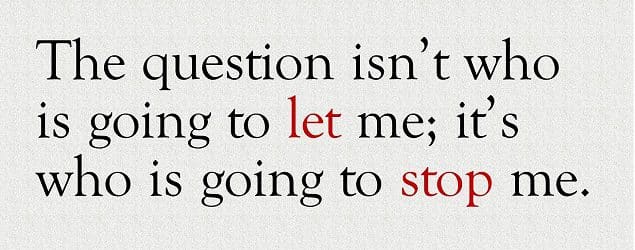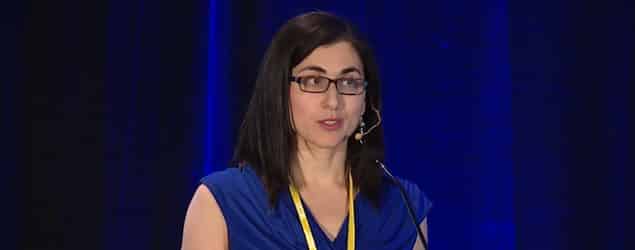“Summon the Courage to Speak Out”
Listen to Onkar Ghate discussing two senses in which the term “self-censorship” is used today. Here’s a transcript:
Dave Rubin: The self-censorship thing — I want you to hit on that a little bit.
Onkar Ghate: I want to talk about the self-censorship thing, because I think it’s a real phenomenon, but you need to distinguish certain things. You can be morally self-censoring yourself, or you’re just intellectually afraid to speak out. And that — the solution for that is just to summon the courage to speak out. So, we’re not in any kind of unique circumstance where it’s hard to speak out today for proper truth and proper values, but it was easy before. Go back in American history — the Abolitionists. They were vilified for speaking out against slavery. But you have to distinguish: Is it social and moral criticism? People won’t want to associate with them, you’re going to lose friends. [Gesturing to Dave Rubin:] I know that’s happened to you. That’s one level.
It’s another level if you’re — and the Abolitionists often were worried about this — you’re going to be beaten up, or maybe even killed. That is a wholly different level, and that is a level where the government should be protecting you. So you asked earlier about what’s happening to free speech in America. There is no free speech in regard to Islam. I really think that. So when there’s self-censorship in regard to Islam, it’s because the government won’t protect the individuals who are willing to speak. This happened with Rushdie, it happened with the Danish cartoon crisis. If newspapers don’t reprint the cartoons when it’s so clearly news, and if part of what they say, and part of what they said is, look, we’re scared of being attacked, of [being] bombed, the government is not going to protect us, they’re not going after the instigators of this, that’s self-censorship where government has clear responsibility.
But there’s other kinds of what people describe as self-censorship where the solution is not, the government needs to protect your rights. It’s, you need to summon the moral and intellectual courage to speak out on these issues, even if people are going to go after you.
I was putting intellectual and moral self-censorship together. So you can be scared because you’re going to be morally attacked: “You’re a bad person for voicing or holding those views.” Or you can just be intellectually attacked: “You’re a stupid person for holding those views.” That is — if that’s all the opposition is, then what you should be doing is holding fast, if what you truly think and what you truly believe and what you truly value, you should be speaking out for that.
I was contrasting that to when — because the term self-censorship is used in that context, and it’s used in the context where a person’s right to speak is actually no longer protected by the government. And I think in regard to Islam, that is the case — that people rightly fear for their lives to speak out on this issue, and that means physically killed. I mean, I’ve done events with Flemming Rose, who was the editor of the Danish cartoons, and I’ve worn a bulletproof vest.
That’s a very different context than someone’s going to tell me I’m stupid or someone is going to tell me I’m a bad person. And I get that criticism that I’m stupid and a bad person all the time. I work at the Ayn Rand Institute. There’s many people who love Ayn Rand. There’s many people who hate Ayn Rand and think she’s the stupidest person in the twentieth century, she’s evil, she advocates selfishness — that, everyone knows is evil. I get that kind of opposition. And if I cowered to that opposition, it would shrink my soul.
If I cower and I’m afraid to speak about Islam, and we decide we’re not going to do an event because someone might blow us up, that’s a very different form, and that — one is the government’s responsibility to say no, we will protect you, we will do whatever we can to protect Rushdie, to protect the Danish cartoonists, to protect the Garland event in Texas where they’re drawing the prophet Muhammad — that’s the responsibility of the government. So, those were the two categories I was distinguishing.
This panel discussion took place on Thursday, October 19, 2017, at Clemson University, Clemson, South Carolina, under the auspices of the Clemson Institute for the Study of Capitalism. The speakers were Onkar Ghate, senior fellow and chief content officer at the Ayn Rand Institute; Jordan Peterson, author and professor of psychology at the University of Toronto; and Dave Rubin, creator and host of The Rubin Report on YouTube.



